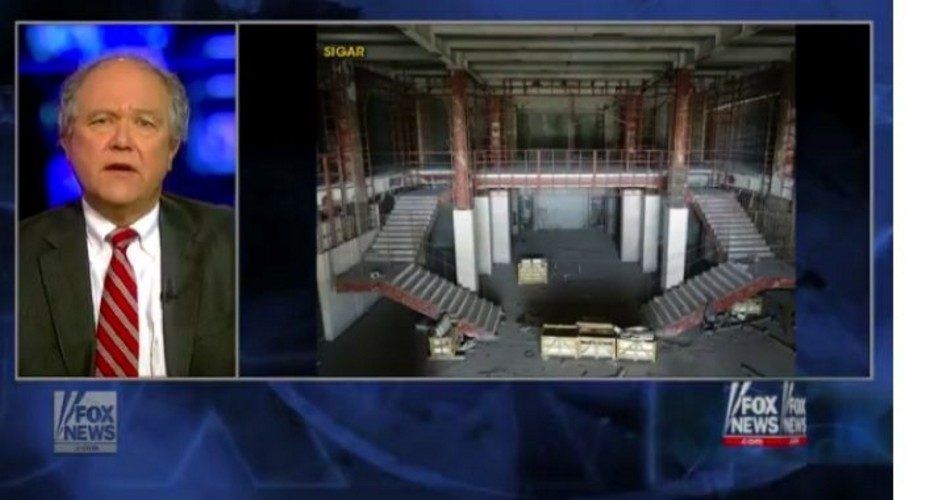
A U.S. government agency loaned $85 million to a developer to construct a hotel (shown) and an apartment complex in Afghanistan, and today it has little to show for its investment except “abandoned empty shells,” according to Special Inspector General for Afghanistan Reconstruction (SIGAR) John Sopko.
In a November 14 letter to Elizabeth Littlefield, president and CEO of the Overseas Private Investment Corporation (OPIC), Sopko said his investigation “indicates troubling management practices and lax oversight by OPIC,” which took the word of the developer that the projects were proceeding as planned rather than visit the sites regularly to monitor progress. “As a result,” wrote Sopko, “the $85 million in loans is gone, the buildings were never completed and are uninhabitable, and the U.S. Embassy is now forced to provide security for the site at additional cost to U.S. taxpayers.”
In 2007, Jordanian citizen Fathi Taher and his American partner, General Systems International LLC, obtained a loan for $60 million from OPIC for the construction of “a 209-room, five-star hotel” (according to an OPIC press release) across the street from the U.S. embassy in Kabul. OPIC estimated the hotel would create “270 permanent jobs for local Afghans” and contribute more than $80 million annually to economic development in Afghanistan. Marriott International agreed to manage the hotel.
“Construction of this hotel will provide significant support for Afghanistan’s economic growth, not least by helping Kabul to modernize accommodations and meeting facilities for the foreign investors engaged in that effort,” Robert Mosbacher, Jr., Littlefield’s predecessor, said in the press release. “It will also introduce Marriott’s world-class management practices to Afghanistan’s hotel industry.”
OPIC began disbursing the funds in February 2009; construction of the hotel started shortly thereafter. By April 2013, with one installment of the loan as yet undisbursed, the developers reported to OPIC that the project would be completed by the end of the year. According to Sopko, the very next month, “multiple news outlets reported that construction of the hotel had been halted due to security concerns in Kabul” and that Marriott was withdrawing from the project. Despite this, when the developers provided OPIC with yet another rosy progress report in June, the agency disbursed the last of the funds, bringing the total to just under $58 million. After receiving the last payment, the recipients notified OPIC that they were stopping all work on the project.
SIGAR inspectors visited the hotel site in August 2016 and discovered an abandoned, unfinished building. Sopko wrote: “We found structural cracks in the walls and roof; damaged fireproofing on steel beams and columns; demolished wall sections; incomplete electrical, elevator, communications, fire prevention/suppression, sewer, heating, ventilation, and air conditioning systems; unfinished concrete masonry units; uninstalled doors and windows; and, many other problems.” His conclusion: “The assurances made to obtain the final loan disbursement were false and misleading.”
In 2010, Taher and another U.S. firm, Apus Apartments LLC, took out a $27 million loan from OPIC for the construction of the Kabul Grand Residences, an apartment building adjacent to the hotel. OPIC said the building would “provide secure housing to local residents, expatriate workers, foreign diplomats, international aid workers, and U.S. government personnel.”
OPIC made three disbursements of the funds beginning in September 2011. As with the hotel, the developers continually claimed progress, yet after the final disbursement was made, they told OPIC they were halting all work on the project.
SIGAR inspected the site on the same day as it inspected the hotel and found that the apartment building, too, was unfinished and abandoned, with problems much like those of the hotel. Clearly, the loan recipients had repeatedly lied about this project’s progress as well.
Of course, it wasn’t too hard to hoodwink OPIC since the agency hardly bothered to check up on the projects’ progress. It took the recipients’ progress reports, along with invoices and receipts, as gospel; the independent firm it hired to monitor the apartment project did likewise. OPIC did visit the sites twice, in May 2012 and April 2013. By April 2013 it should have been clear that the projects were far behind schedule, if they were progressing at all, yet OPIC continued to fund them.
Sopko recommended that OPIC “use more robust oversight practices” in the future and “take immediate action to recoup the loan funds from the recipients.”
In her response, Littlefield, while agreeing with Sopko’s recommendations, took issue with his characterization of OPIC’s oversight. She noted that it was difficult for anyone to monitor the projects because of the security situation in Kabul. Also, although “OPIC was aware there were issues with the projects,” the agency “determined that the best way to address the outstanding loan that had already been disbursed, and accomplish its development objectives, was to allow the project developer to continue work on the project.” In other words, OPIC decided to pour more money into troubled projects in hopes of rescuing them.
Private investors, on the other hand, would hardly be likely to do that, especially without strict oversight of the projects. But OPIC, Littlefield pointed out, “tak[es] risks that commercial lenders are not willing to take,” i.e., ones that people wouldn’t voluntarily take with their own money. Instead, as The New American’s Thomas Eddlem put it, agencies such as OPIC “guarantee profits to politically connected corporations that take casino-style risks with everyone else’s dollars.” While OPIC has thus far been self-funding, its actions occur with the tacit understanding that Congress isn’t likely to let the agency — unconstitutional though it may be — go belly up, and thus OPIC has less incentive than a private investor to ensure that its money is well-spent.
OPIC is hardly alone among government agencies in blowing wads of cash in Afghanistan. Indeed, it looks like a piker compared to the many other agencies that have wasted billions of taxpayer dollars on reconstruction projects in the “Graveyard of Empires,” according to previous SIGAR reports. Worse still, some of this money has actually gone to enemies such as the Taliban. It’s one thing to fritter taxpayer dollars away; it’s quite another to be so careless as to fund one’s own foes.
After 15 years of illegal, feckless, and expensive war and reconstruction in Afghanistan, maybe it’s time for Uncle Sam to pack it in.

